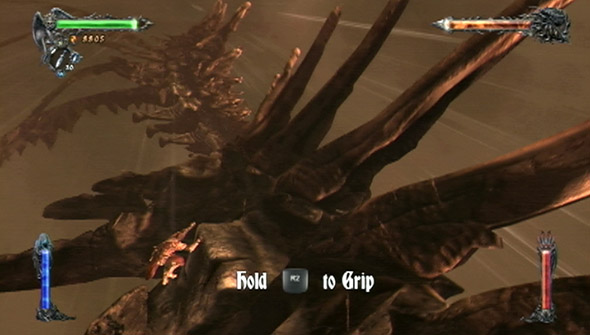Last updated on May 2, 2014
Castlevania: Lords of Shadow certainly looks like a game I would enjoy. Konami’s newer “reboot” (who knows how long that’ll last) contains varied environments, lots of different enemies, crazy boss fights, and a pretty well-designed combat system with all the accouterments you’d expect. MercurySteam strives for a completely linear experience without making it feel like you’re on rails, and I appreciate that approach. Still, I found myself relatively bored with it when booting the game last time. I’m really trying here!
In what I could only describe as blatant plagiarism of God of War AND Shadow of the Colossus at the same time, a giant appear out of a frozen lake and tries to smash you. The developers expect you to proceed through their list of context-sensitive actions (mostly climbing and hitting the square/X button a whole lot) while appreciating the “cinematic” quality of the visuals. I wasn’t impressed. In addition to forcing the player through a list of rather rout button presses (even my favorite games aren’t immune to quicktime events), it’s just rather boring. Gabriel Belmont climbs slowly, so the excruciating pace means the climax isn’t all that wonderful.
Then, when you’re about to beat the massive creature, cutscene! Way to take the player out of the moment, right? Then you listen to people prattle on about Lords and demons and IMPORTANT plot points for 5-10 minutes before proceeding out of the first act. Not sure why, but all of this turned me off completely. And I usually put up with this sort of thing in my favorite video games, from JRPGs and otherwise. What gives?
I imagine the rather “traditional” games I’ve played lately give me an aversion to it. Video games often try for two different approaches: participation and observation.
Participation
Participation is the element everyone loves in video games: the ability, or appearance thereof, to actively engage in activities (repetitive sentence structure, but it works well enough). Designers, in their (hopefully intricate wisdom), create worlds with their intended rules and systems in mind. The controls reflect the way in which they want you to interact with their systems.
An effective director has a general idea of what their game will do – will this be the definitive combat action game? Do I want to tell a story? How do I make a fair, balanced competitive experience? Then, they mold these into different bits and pieces, each appended onto some aesthetic. A good aesthetic sense looks beautiful and appealing while easily conveying the information that the developer wants you to know. If you don’t pick up on it at first glance, it’s not neccessarily a failure on their part, but they try their best to convey that information.
Take fighting games, for example. Each character has a rather exhaustive move set, and most moves exist for very specific purposes (hence, why “top tier” characters have many moves that work in several situations). Part of the learning process involves knowing when to use what at which time, and also when NOT to use something. Second, you must learn the ranges and uses of all those attacks at various ranges. Third, you must arrange all these tools into a formidable, and effective, offense. You can figure most of this out just via experience and play if you actually think critically about what’s happening onscreen. The moves themselves often reflect their use too; just examine it. You must actively participate all the time to play fighting games effectively (unlike me!).
Observation
On the other hand, some video game force you into a passive mode of interaction more akin to film or a novel. We call this “observation”, a passive transmission of information where you accept and understand information presented to you with, but more often without, your consent. You can imagine that observation and participation often clash when a person who played video games “back in the day” comes face-to-face with the more cinematic product of today. So far, at least from my perspective, observation transformed from “looking at your environment for clues” to “making a movie”.
Obviously, the example of Castlevania: Lords of Shadow contrasts greatly with previous franchise entries. Most every Castlevania provides a few cutscenes/pieces of dialogue/vague context for all the supernatural events happening, but none come with more forces or vigor than this “Kojima” production. That’s not unexpected from any involvement with Metal Gear Solid’s film-influence director, but that new direction for the series turned me off quite a bit. The story isn’t told through detail, but through long bits of exposition. Video game stories, somehow, haven’t gotten past the point of long-form exposition; most of them remind me of the info dump at the end of The Matrix Reloaded when Neo talks to the Architect.
Video games are ripe for understated observation. Game makers build worlds, worlds to explore and actively participate. Exploration games like Dark Souls give you moments to view the design of their world and make conclusions based on vague information; that gives the observation a much more interesting tone. When your imagination can fill in the blanks, that makes the process of seeing the narrative behind it much more enjoyable. Video games, as they are now, experiment with the same story-telling forms as their predecessors, and it’s killing me to see them try to recreate film or books inside of a completely different medium.
I want to see more games take advantage of the player’s lack of knowledge. I want to see them force us to observe their intricately crafted environments, or at least respect them for being unique, fascinating, and appealing. I want more stories to come out of the world’s natural shape, rather than some generic plot added onto all that great art and game design. Observation only works as a good exercise for games if we give players some incentive to actually observe anything. Excessively tutorializing, explanations, aspirations to novels and explicit cutscene movies of interminable length will not do. Give us a reason to observe and explore, and we will join right alongside. Fail, and you make me go right through the God of War motions to kill the boss with predetermined button presses. Or, worse, make the game completely uninteresting at the expense of the story (Xenogears and Chrono Cross come to mind).
Can video games access both approaches without diluting one or the other? That remains as the ultimate question here. Of course, I would not say anything about it if I did not have an opinion on the topics, so what says I?


